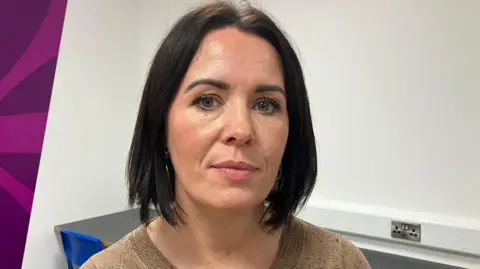Parents urged to make children aware of catfishing dangers
 BBC
BBCParents have been urged by the Department of Education (DE) to make their children aware of the dangers of catfishing.
The warning comes in the wake of the conviction of Alexander McCartney for a litany of child sex offences.
McCartney was given a life sentence with a minimum of 20 years in jail for the extreme online sexual abuse of children and the manslaughter of a 12-year-old girl.
The department's letter to parents said the case "had highlighted the potential dangers of catfishing."
"Catfishing is when someone creates a fake online profile to trick people into forming relationships with them," it said.
"You may be aware of a recent news story about an individual in Northern Ireland who was involved in a large-scale catfishing case with devastating consequences.
"We want to ensure that you have the information and tools to keep your child safer online."
'It can lead to some terrible things'

Teenagers at Glengormley Integrated College in County Antrim told BBC News NI that catfishing was something they had to watch out for online.
"I have to think about that a lot because it's so easy to pretend to be someone you're not," 15-year-old Ruby said.
"It does happen now a lot and it's so easy it could happen to people, and you hear it on the news a lot so you do have to look out for it at my age," she said.
"You can get groomed or you'd send photos or money," she added.
"It can lead to some terrible things which we've heard about so you do need to keep an eye on it and tell people if it's happened to you and look out for it."
18-year-old Jessica said it was something she was aware of "constantly".
"I come from an all-girls family so every single one of us have experienced some aspects of it, so we're very aware of it now," she told BBC News NI.
"But honestly I think everybody needs to be aware of it because of the amount it happens.
"It is a bit crazy now."

Staying safe online
The Department's letter to parents also asked parents and pupils to use the Safer Schools NI app, which has a plethora of information about how to stay safe online.
But it also advised parents to be aware of catfishing.
16-year-old Jeriel said he did not mind his parents talking to him about what he was doing online.
"I'm thankful for my parents, they do," he said.
"When I was young I used to play this game called Roblox where you could chat to other children or people that say they're children."
"You could just chat to other people online and my parents saw me playing this and they sat down with me and had a talk about the dangers online."
"Someone else could say they're nine years old, but in reality be 30 years old."
Roblox recently introduced new safety features for children under the age of 13, following criticism of how it protected younger users.

Peer mentors
Glengormley Integrated College has around 1,000 pupils.
The school brings in outside organisations like Thrive and the Police Service of Northern Ireland (PSNI) to take online safety classes.
However, they've also trained some senior pupils as peer mentors to advise younger ones about online risks.
"It's advice coming from a young person to another young person," the vice-principal Natalie Clarke said.
"They're savvy, they use their phones 24/7 and they're able to give really positive advice to our young people," Ms Clarke said.
"There's a trust, a relationship there with our pupils and they're just going to get advice."
The school, though, has recently adopted a policy prohibiting mobile phones being used in school.
That came after new guidance from the Department of Education (DE) advising school to restrict pupils from using mobile phones during the school day.
